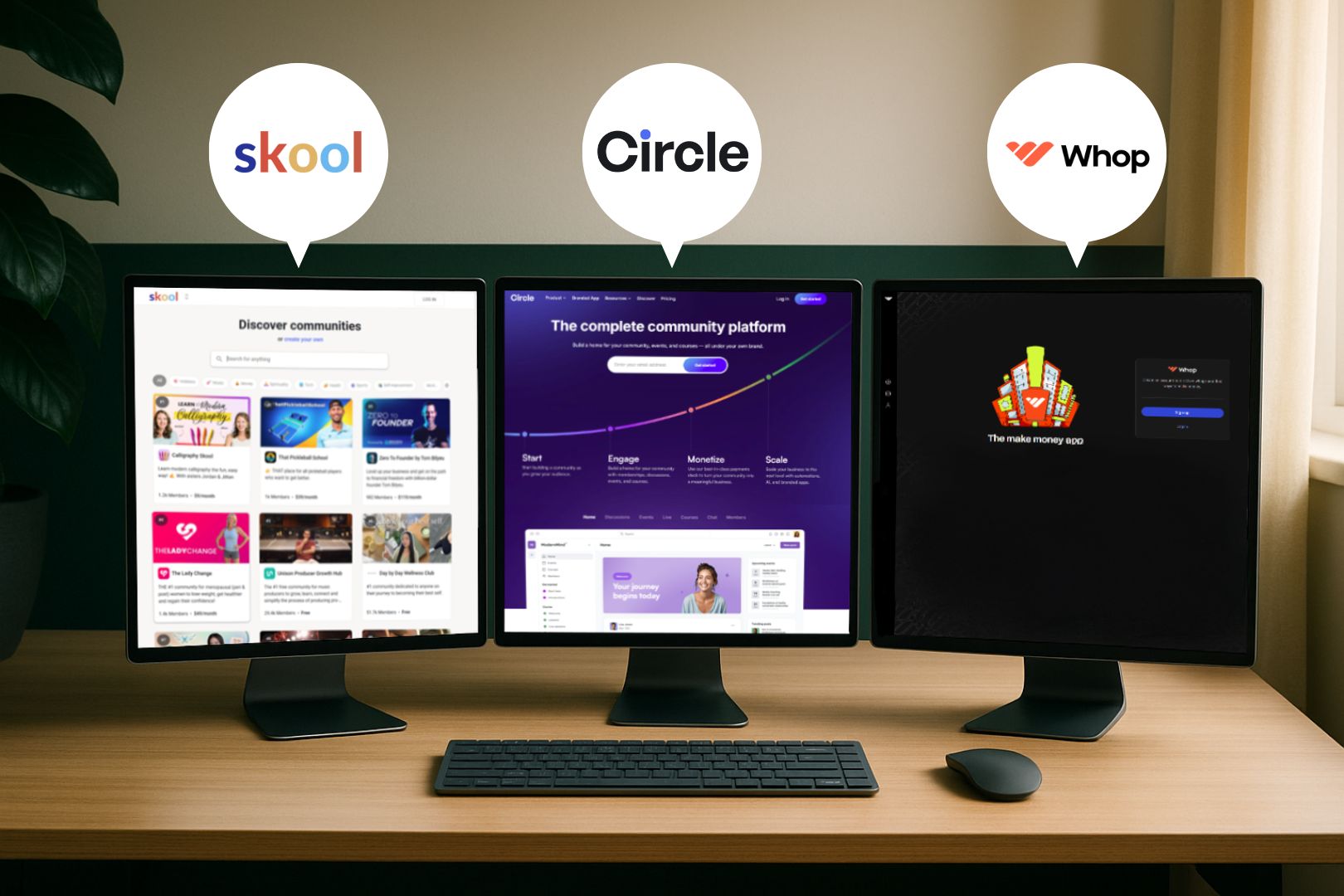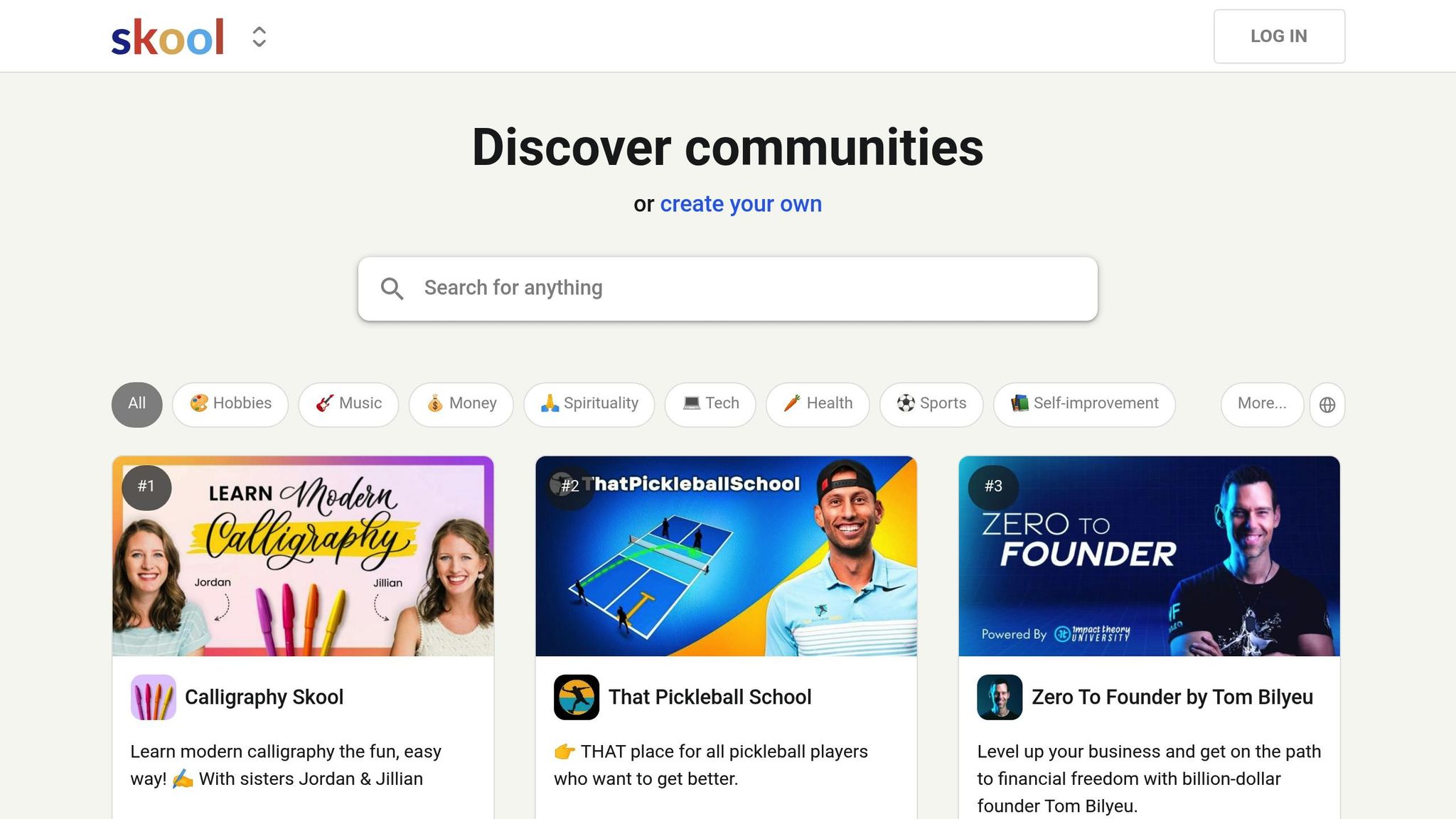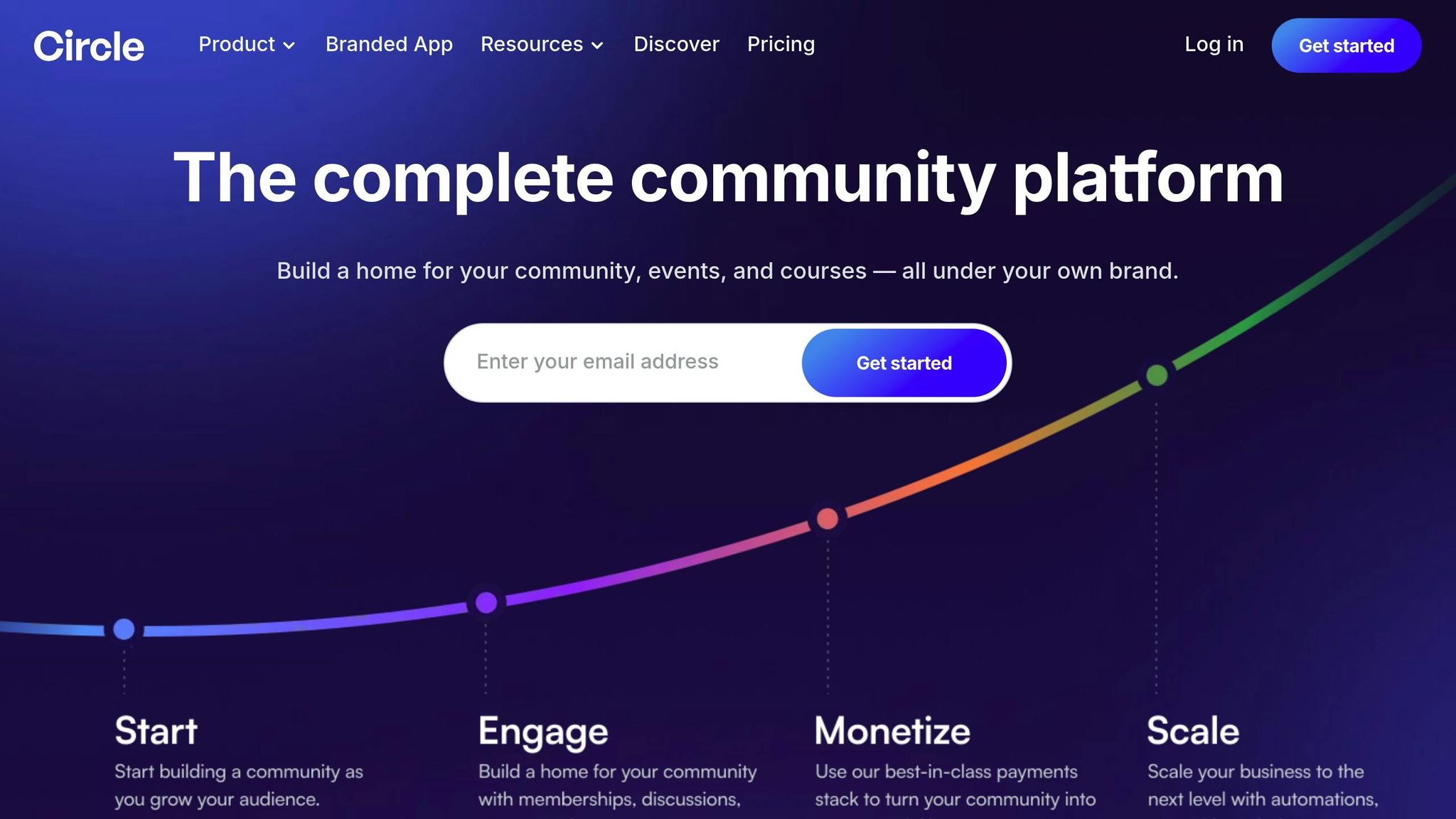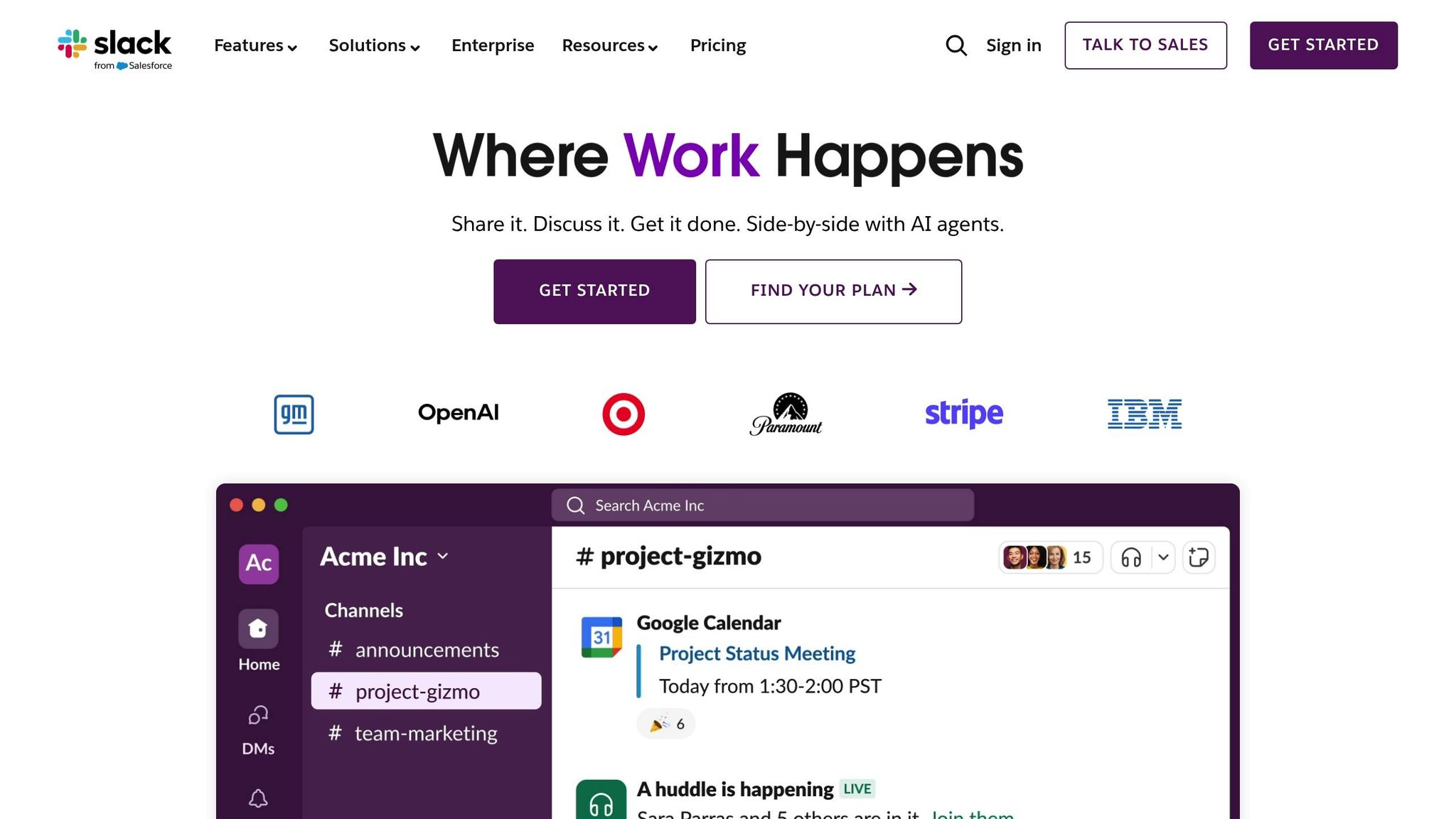Looking for the right platform to host your community? Here’s a quick guide to help you decide between Skool, Circle, and Whop based on your goals and priorities:
- Skool: In my humble opinion, it’s the best platform out there, and reminds me of what monday.com was before we scaled. Offers gamification, course tools, and a simple interface to boost engagement.
- Circle: Ideal for organizing large amounts of content.
- Whop: Tailored for selling products, leans more heavily towards ecommerce.

Quick Comparison
| Platform | Focus Area | Key Features | Best For |
|---|---|---|---|
| Skool | Engagement & revenue | Gamification, course tools, simple design | Learning-focused communities |
| Circle | Content Organization | Spaces, groups, content embedding | Large content & tons of data |
| Whop | Digital Products | Payment processing, subscriptions | Selling digital products |
Choose Skool if you want active participation, Circle for content-focused organization, or Whop to sell digital products. Your choice depends on your community’s specific needs!
Network Effects in Community Building
While Skool is by far the least ‘advanced’ platform with the fewest analytics, it’s still my absolute favorite for many reasons. One key one is how it leverages network effects far better than any other platform out there.
The value Skool as your community home increases as more people join the platform. Each new member adds to the content, opens up more connection opportunities, contributes to the collective knowledge, and improves the quality of discussions. This idea forms the backbone of how Skool leverages network effects to boost community engagement.
How Skool Enhances Network Effects

Skool’s design, centered on learning, strengthens network effects through three main features:
| Feature | Impact on Network Effects |
|---|---|
| Gamification | Promotes regular participation and friendly competition |
| Course-Centric Structure | Fosters shared learning experiences that bring members closer |
| Simplified Interface | Makes it easier for members to engage and interact |
One amazing thing I’ve seen after spending years on Skool is how diverse the superfans are. I’ve seen folks as young as 16 and as wise at 86 loving the platform.
The way they’ve built the platform encourages members to work toward common learning goals while supporting each other. By focusing on shared achievements, Skool builds stronger connections among its members compared to platforms that prioritize content organization or transactions. These design elements create a dynamic community, making Skool stand out when compared to platforms like Circle and Whop.
Comparing Network Effects Across Platforms
Different platforms take unique approaches to building network effects:
- Skool prioritizes shared learning experiences, where progress and course completion naturally spark deeper engagement and meaningful conversations.
- Circle provides powerful organizational tools to support community interactions, though it often requires more hands-on management to maintain focused engagement. The data Circle offers is vastly superior to every other platform.
- Whop connects buyers and sellers effectively, but its emphasis on transactions limits the depth of community relationships.
Here’s how each platform drives connections and their resulting network effect strength:
| Platform | Connection Focus | Network Effect Strength |
|---|---|---|
| Shared learning goals | Strong | |
| Circle | Common interests | Moderate |
| Whop | Transaction-based relationships | Limited |
My goal here is to highlight how Skool’s focus on shared learning experiences leads to stronger community bonds compared to platforms that lean more on transactional or organizational structures.
Platform Analysis: Skool, Circle, and Whop

Skool: Engagement and User Experience
Skool simplifies the learning process with tools designed to encourage participation and smooth onboarding. By using gamification and integrating courses directly into the platform, it keeps members engaged and motivated to complete learning objectives.
Circle: Community Organization Tools
While Skool prioritizes engagement, Circle shines when it comes to organizing content. It provides tools to structure and manage diverse community needs effectively.
| Tool | Function | Best Used For |
|---|---|---|
| Spaces | Dedicated areas for specific topics | Topic-based discussions and resource sharing |
| Groups | Member categorization | Creating focused sub-communities |
| Content Embedding | Rich media integration | Enhancing learning materials and resources |
Whop: Community Monetization Features
If you want to sell products to people, Whop offers tools specifically tailored for it.
| Feature | Benefit | Application |
|---|---|---|
| Payment Processing | Secure transaction handling | Facilitates direct product and service sales |
| Digital Product Integration | Streamlined content delivery | Automates access to paid content |
| Subscription Management | Manages recurring revenue | Handles different membership levels |
Skool works best for learning-focused groups, Circle excels at organizing content and interaction, and Whop is ideal for communities looking to monetize through digital products. The right choice depends on your community's goals and how you want to engage with your members.
Every community builder I work with, I encourage them to choose , but you should consider which one is best for you.
Slack and Discord as Community Platforms

Communication Tools vs Community Platforms
While Slack and Discord are excellent for real-time communication, they fall short when it comes to fostering long-term community connections. Their primary focus is on messaging and team collaboration, which makes them less effective for organizing and preserving discussions in a community setting.
One major drawback is their chat-based design. Messages are displayed in chronological order, making it easy for important information to get buried and hard to retrieve later.
| Aspect | Slack/Discord | Dedicated Community Platforms |
|---|---|---|
| Content Organization | Linear chat format | Structured spaces and forums |
| Information Retention | Messages quickly buried | Organized content libraries |
| Member Engagement | Reactive communication | Tools for proactive engagement |
| Learning Experience | Ad-hoc knowledge sharing | Structured course delivery |
| Monetization | Limited options | Built-in payment systems |
These differences highlight why dedicated platforms are better suited for building and maintaining robust communities.
Platform Feature Comparison
Dedicated community platforms go beyond basic communication tools by offering features designed to strengthen community bonds. Here's a closer look at how they compare:
| Feature | Slack/Discord | Dedicated Platforms |
|---|---|---|
| Member Profiles | Basic user info | Detailed community profiles |
| Content Organization | Channel-based | Multi-format content hierarchy |
| Event Management | Basic scheduling | Comprehensive event tools |
| Resource Library | Limited file sharing | Advanced content management |
| Monetization Tools | Restricted monetization | Integrated payment processing |
| Analytics | Basic activity metrics | In-depth engagement tracking |
For larger communities, Slack and Discord's limitations become more apparent. They are great for micro communication, but fail when it comes to communicating to larger groups that want to meaningfully connect with one another.
While integrations and bots can enhance their functionality, this often results in a fragmented experience that requires additional technical setup.
sbb-itb-bc79881
Making Your Platform Choice
Choosing the right community platform depends on your specific needs. Here's a quick breakdown:
- Skool: Great for creating an interactive, gamified learning space that encourages member interaction.
- Circle: Offers strong tools for organizing content and segmenting members effectively.
- Whop: Focused on selling products.
| Factor | Skool | Circle | Whop |
|---|---|---|---|
| Primary Focus | Learning & Engagement | Content Organization | Sales & Revenue |
| Platform Complexity | Simple | Moderate | Moderate |
| Network Effect Strength | High | Medium | Medium |
| Setup Requirements | Minimal | Advanced | Advanced |
| User Experience | Streamlined | Feature-rich | Commerce-focused |
Use this table to match your community's goals with the platform that fits best.
Platform Selection Guide
Engagement-First Communities
If your goal is to build a lively, interactive learning community, Skool is a strong option. Its straightforward interface and gamified features naturally encourage member participation and knowledge sharing.
Content-Oriented Communities
For communities centered on structured content and courses, Circle provides the tools you need. Its detailed content management system supports organized hierarchies and tailored member experiences.
Selling Products to your Community
If your priority is monetization, Whop is designed with e-commerce in mind. It simplifies the process of selling digital products and managing memberships.
Keep in mind that network effects play a big role in long-term community growth. Skool's setup is particularly effective at fostering member interaction, which can amplify the value of your community over time.
FAQs
What should I consider when choosing between Skool, Circle, and Whop for building my community?
When deciding on a platform for your community, key factors to consider include network effects, the quality of the platform’s team, and how easy it is for members to use and stay engaged.
Skool stands out for its strong network effects, intuitive design, and a team that prioritizes user experience, making it a top choice for fostering meaningful connections.
While Circle and Whop also offer solid features, they may not create the same level of community interactivity and engagement. Consider your specific goals, the type of connections you want to build, and how well each platform aligns with your needs before making a decision.
What role do network effects play in building a successful community on platforms like Skool?
Network effects are essential for building a thriving community on platforms like Skool. These effects occur when the value of a platform grows as more people join and interact. As the user base expands, connections become stronger, engagement increases, and the community becomes more dynamic and appealing.
Platforms with strong network effects create an environment where members naturally want to participate and connect, fostering a sense of belonging. This is why tools designed to maximize these effects, like Skool, often lead to more vibrant and successful communities compared to platforms that lack these capabilities.
Can I use platforms like Skool, Circle, or Whop together with Slack or Discord to build my community?
While you can use platforms like Slack or Discord for your community, they aren’t ideal for creating meaningful connections. These tools function more like fragmented social media feeds rather than purpose-built community platforms.
Platforms such as Skool, Circle, and Whop are better suited for fostering deeper engagement, thanks to features designed specifically for building strong, connected communities. For the best results, consider focusing on a platform that prioritizes interaction and collaboration rather than splitting your community across multiple tools.


